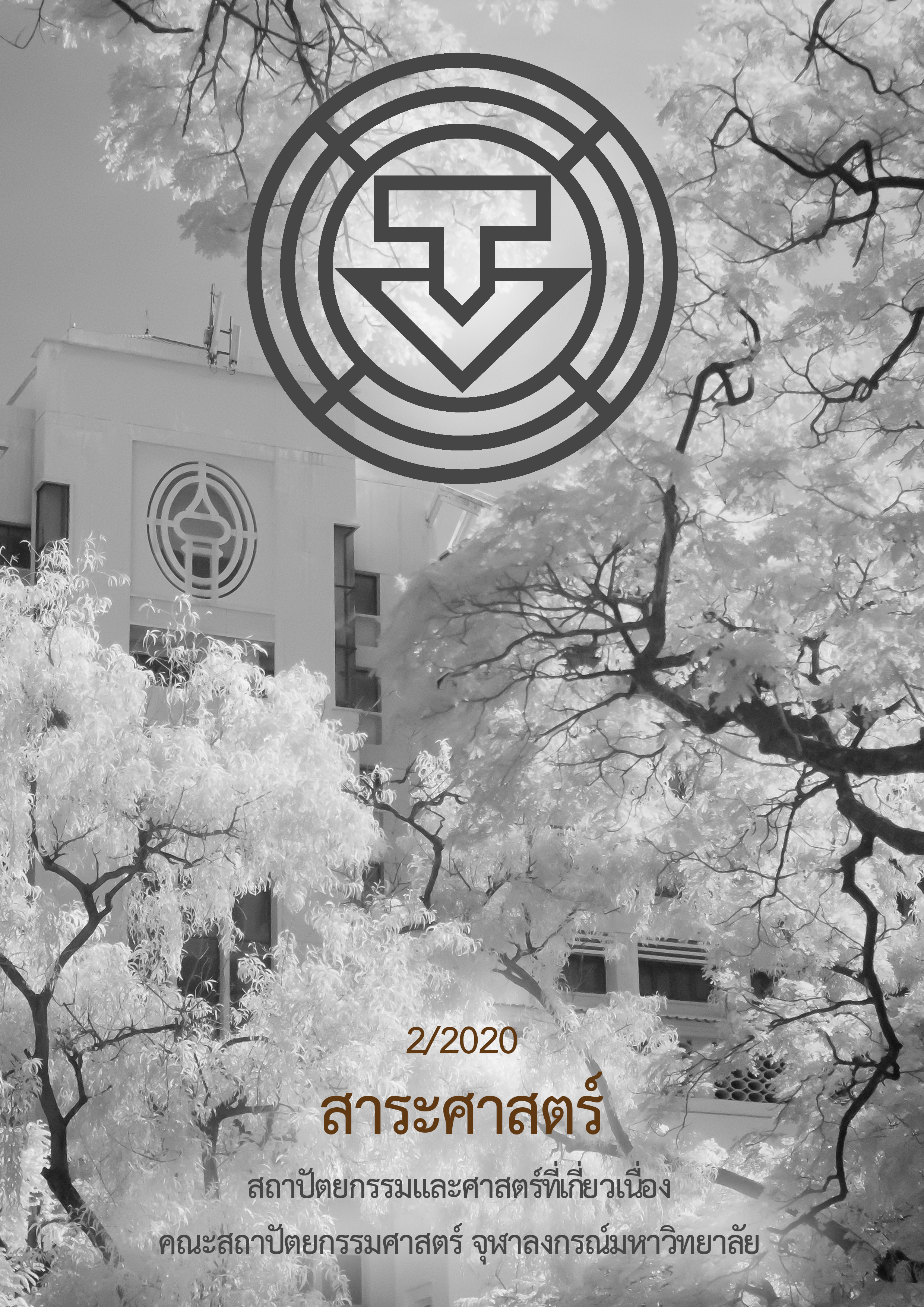The การเปลี่ยนแปลงที่มีต่อกิจกรรมเพื่อการอยู่อาศัยในเมืองภายใต้เทคโนโลยีดิจิทัล กรณีศึกษา: ที่อยู่อาศัยหนึ่งหน่วยของคอนโดมิเนียม Transformation of Residential activities in CBD under digital technology Case study : single living unit of Condominium
Main Article Content
บทคัดย่อ
บทความนี้มุ่งศึกษาการเปลี่ยนแปลงขององค์ประกอบทางกิจกรรมสำหรับการออกแบบที่อยู่อาศัย ภายใต้ปัจจัยทางเทคโนโลยีดิจิทัลที่เป็นตัวขับเคลื่อนในปัจจุบันและอนาคต โดยกำหนดตัวแปรการขับเคลื่อนทางเทคโนโลยีดิจิทัลเป็น 5 ปัจจัยได้แก่ 1) การบริการ (service) 2) การควบคุม (control) 3) การแสดงผล (visualize) 4) การทำให้เป็นส่วนบุคคล (personalize) 5) การสื่อสาร (communicate) และจำแนกประเภทของกิจกรรมออกเป็น 4 ประเภท ได้แก่ 1) กิจกรรมทางชีวภาพ 2) กิจกรรมทางการผลิต 3) กิจกรรมทางการปฏิสัมพันธ์ 4) กิจกรรมทางนันทนาการ วิเคราะห์การเปลี่ยนแปลงผ่าน 3 องค์ประกอบของกิจกรรม ได้แก่ 1) กริยาของขั้นตอน 2) เครื่องมือ 3) พื้นที่
ผลการศึกษาพบว่า การเปลี่ยนแปลงเชิงกริยาขั้นตอนแบ่งเป็น 2 ลักษณะ 1. ส่งผลโดยตรงต่อการทำงานของกิจกรรม โดยตัวขับเคลื่อนทางเทคโนโลยีดิจิทัล 3 ปัจจัย คือ Control Visualize และ Service 2. ส่งผลทางอ้อมต่อการทำงานของกิจกรรม โดยตัวขับเคลื่อนทางเทคโนโลยีดิจิทัล Personalize ทำงานส่งผลต่อ Control Visualize และService แล้วจึงส่งผลต่อกิจกรรม ตัวขับเคลื่อนทางเทคโนโลยีดิจิทัล Communication เป็นส่วนเชื่อมต่อการทำงานของ Control Visualize Service และ Personalize แล้วจึงส่งผลต่อกิจกรรม การเปลี่ยนแปลงเชิงพื้นที่แบ่งเป็น 3 ประเภท มีผลมาจากเครื่องมือและกริยาขั้นตอน ได้แก่ 1. ลักษณะพื้นที่การใช้งานหายไป 2. ลักษณะพื้นที่การใช้งานน้อยลง และ3. พื้นที่การใช้งานมากขึ้น ผลการศึกษาเป็นส่วนหนึ่งของข้อมูลเพื่อสนับสนุนการสร้างแนวทางการพัฒนาการกำหนดโปรแกรมการออกแบบที่อยู่อาศัยภายใต้ตัวขับเคลื่อนเทคโนโลยีดิจิทัลในอนาคต
Article Details
เอกสารอ้างอิง
Terrabkk. “Proptech คืออะไร ทำอะไรได้บ้าง.” สืบค้น 27 มิถุนายน 2560. http://thairealestate.org/content/detail/344/Proptech-คืออะไร-ทำอะไรได้บ้าง.
Bhatrakarn, T. สถาปัตยกรรมกับการออกแบบสร้างสรรค์อย่างดิจิทัล. [Design plus digital]. Bangkok:
Kingmongkut’s Institute of Technology North Bangkok Press, 2003.
RE TALK 2017: RE-mind the GAP ”Please Mind the Gap between ‘TREND’ and ‘PLATFORM.’” [เทปบันทึกเสียง]. โครงการปริญญาโทธุรกิจอสังหาริมทรัพย์ คณะพาณิชยศาสตร์และการบัญชี มหาวิทยาลัยธรรมศาสตร์, จัดขึ้นที่ Victor Club Business Center at FYI Center, กรุงเทพฯ, 9 กันยายน 2560.
Sansiri. “Prop Tech อสังหาฯ ยุคใหม่ที่คนอยากมีบ้านต้องรู้จัก.” สืบค้น 9 สิงหาคม 2562. https://blog.sansiri.com/prop-tech-technology/.
อรศิริ ปาณินท์, ปิยลดา ทวีปรังษีพรและเทิดศักดิ์ เตชะกิจขจร. ภูมิปัญญาสถาปัตยกรรม. กรุงเทพฯ: ศูนย์ตำราและเอกสารวิชาการ คณะสถาปัตยกรรมศาสตร์จุฬาลงกรณ์มหาวิทยาลัย, 2546.
Allameh, E. “Daily Livings in a Smart Home: Users' Living Preference Modeling of Smart Homes.” Ph.D. Thesis, Urban Planning and Transport, Department of the Built Environment of the Eindhoven University of Technology, 2016.
Jacques Bughin, Hazan, Eric, Allas,Tera, Hjartar, Klemens, Manyika, James, Sjatil, Pal Erik and Shigina, Irina. Tech for Good’: Using Technology to Smooth Disruption and Improve Well-being. San Francisco: Mckinsey Global Institute Analysis, 2019.
Moore, G.E. “Cramming More Components onto Integrated Circuits.” Electronics IEEE Solid-State Circuits Society Newsletter 38, 8 (April 19, 1965): 114-117.


